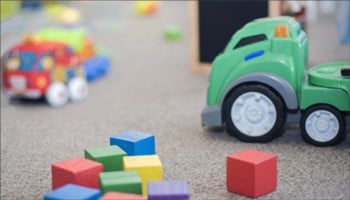Non-Tech Gift Ideas to Boost Kids’ Language and Learning
Expert Suggestions for Holiday Gifts That Build Skills by Age Group

With “smart” toys and electronics of all types in high demand this holiday season, the American Speech-Language-Hearing Association (ASHA) is suggesting holiday gift alternatives for kids that will help boost their language and learning skills—at any age.
Low-tech toys contribute positively to children’s development. They help children improve their vocabularies, conversation and turn-taking skills, problem-solving abilities, social skills, imagination and creativity, attention spans, and more. Whatever you call them—traditional, classic, or old-fashioned—these toys also are often less expensive and a better all-around value than electronic toys and devices.
Below are some suggestions from ASHA for holiday gifts by age range.
Ages 0–5
- Books (touch-and-feel, lift-the-flap, and simple picture books for the youngest kids)
- Shape sorters, ring stackers, and nesting cups
- Blocks and balls
- Chunky wooden and knob puzzles
- Animal and family sets
- Toy farms and barns
- Toy vehicles, garages, ramps/tunnels, and train sets
- Wind-up, pop-up, and pounding toys
- Pretend tools and workbenches
- Toy musical instruments
- Bubbles
- Activity cubes
- Pretend money and cash registers
- Simple craft kits and art supplies such as crayons and Play-Doh
- Figurines, dinosaurs, dolls, and puppets
- Costumes and dress-up supplies
- Pretend doctor/veterinarian sets
- Toy food, grocery carts, and kitchen sets
- Building toys (e.g., Lincoln Logs, Magnatiles, and Legos)
Ages 5–8
- Books, graphic novels, and magazine subscriptions (e.g., Highlights, National Geographic Kids)
- Board and card games
- Arts-and-crafts supplies and kits (drawing, beads/jewelry)
- Science kits and books of science experiments
- Slime, Play-Doh, and play sand/foam
- Modeling clay and silly putty
- Dolls and action figures
- Building toys (e.g., Lincoln Logs, Magnatiles, and Legos)
- Trading cards
- Cooking supplies (child-friendly cookbooks, kid-safe knives/utensils)
- Subscription boxes (cooking, STEM)
- Costumes and dress-up supplies
- Magic sets
- Jump ropes and hula hoops
- Sports and outdoor games for group play
- Bikes, scooters, and roller skates/blades
Ages 8 and up
- Chapter books and magazine subscriptions (e.g., Sports Illustrated Kids, Cricket)
- Journals/diaries and scrapbooks, fun writing pens/stickers
- Board and card games (silly, trivia, conversation-based)
- Trading cards
- Arts-and-crafts project sets
- Science kits, instruments (telescope, microscope)
- Subscription boxes (cooking, STEM)
- Advanced building sets (e.g., Legos, snap circuits)
- 3D/jigsaw puzzles
- Crossword puzzles, Sudoku, and chess sets
- Camping supplies
- Sports equipment
- Fitness, outdoor/yard, and obstacle course games
- Age-appropriate tools or gardening supplies
- Décor for personalizing bedroom
Be “Tech Wise” With Young Children
Find more information and advice about how to build healthy screen habits for children and families from ASHA and the Screen Time Action Network at Fairplay. Tips by age can be found in the following resources: Be Tech Wise With Baby! [PDF] (birth to 1 year); Be Tech Wise With Toddler! [PDF] (1 to 3 years); Be Tech Wise With Preschoolers! [PDF] (3 to 5 years).
Are You Concerned About Your Child’s Development?
If you have concerns about your child’s speech, language, learning, or literacy skills, contact a certified speech-language pathologist for an evaluation. View ASHA’s milestones checklists to see communication skills that are typical by age range (birth to 5) at on.asha.org/dev-milestones. These checklists are a good starting point for raising any concerns or questions with your child’s doctor.
Families with children ages birth to 3 years can connect with their local early intervention program for an evaluation. For children older than 3 years, families can reach out to their local school. Children at any age can also see a private speech-language pathologist. A searchable database of these professionals is available at www.asha.org/profind/.











